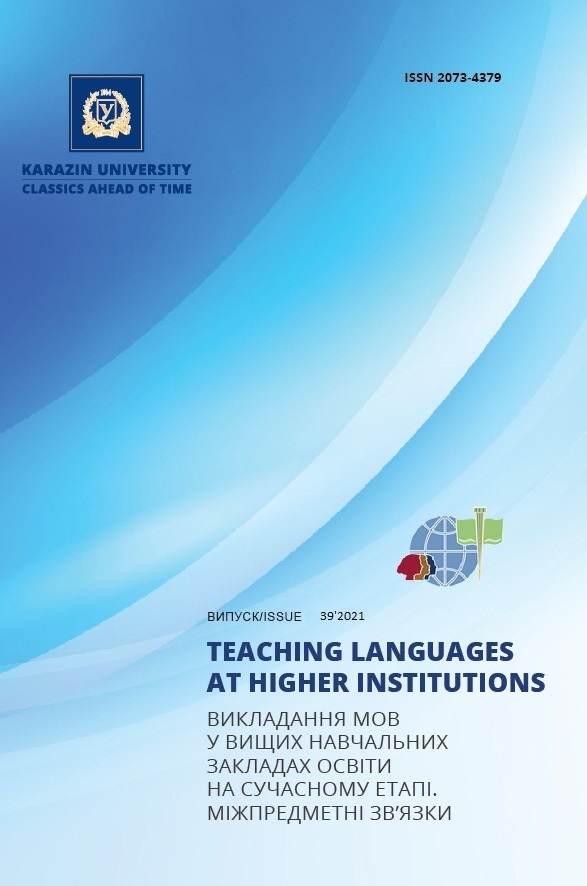The main stages of teaching foreign students to perceive folklore works
Abstract
The article is devoted to the description of the methodology for teaching foreigners to understand Ukrainian folk tales, which would help students understand the meaning of fairy tales at a level close to that one of native speakers. Fairy tales are an ideal field in which the methodology of linguocultural studies can be effectively used. The relevance of the research is determined by the importance of the linguoculturological approach to teaching Ukrainian as a foreign language. There is no system of exercises for teaching Ukrainian folk tales, which would contribute to the formation of a holistic view of the Ukrainian national mentality among foreign students. Teaching foreign students to read and understand the content of Ukrainian folk tales will be effective if they rely on the knowledge about the value system of Ukrainian folk culture, understanding of the realities and linguistic features of Ukrainian folk tales; comparison of plots of Ukrainian folk tales with those of fairy tales of the native culture of foreigners. We believe that the use of the texts of Ukrainian folk tales is advisable in classes of Ukrainian as a foreign language at all stages of education. The content of Ukrainian folk tales reflects the mentality of the Ukrainian people and is a source for understanding the value foundations of Ukrainian culture. The methodological system of working on the texts of fairy tales in a foreign audience should be based on linguoculturological commentary and a comparison of the values of Ukrainian culture with the values of the native culture of foreigners. During the training, the spiritual world of foreign students is enriched due to their acquisition of knowledge about the customs, traditions of Ukraine, understanding of the national and cultural specifics of linguistic units. This is the key to successful communication between representatives of different peoples, languages, and cultures, and in a global sense, it correlates with the actual problems of interlanguage and intercultural communication. Prospects for further research are to determine a linguo-methodological basis for the selection of Ukrainian folk tales and ways of their presentation to a foreign audience; in conducting experimental verification of the effectiveness of the developed methodological model
Downloads
References
Bordovskaja, A.V. (2003). Obuchenie chteniju russkoj narodnoj skazki v inostrannoj auditori (lingvokulturologicheskij i metodicheskij aspekty. [Teaching foreigners to read the Russian folk tale (linguocultural and methodological aspects)]. Extended abstract of the candidate’s thesis. Saint Petersburg. Available at: http://irbis.gnpbu.ru/Aref_2003/05-06789.pdf [Accessed 22 Aug. 2021] [in Russian].
Yelisova, M.O. (2010). Komentovane chytannya hudozhnih tvoriv: navchalnyj posibnyk dlya inozemnyx studentiv [Commented reading of literary works: a textbook for foreign students]. Kyiv: Interservis [in Ukrainian].
Yelisova, M.O. (2011). Osoblyvosti roboty nad tekstom ukrayinskoyi narodnoyi kazky v inshomovnij audytoriyi [Specifics of working on the text of the Ukrainian folk tales in classes for foreigners]. Teoriya i praktyka vykladannya ukrayinskoyi movy yak inozemnoyi [Theory and practice of teaching Ukrainian as a foreign language]. 6, pp. 190−195 [in Ukrainian].
Podruchnaja, L.Ju. (2013). Folklornyj tekst na zanjatijah RKI: vosprijatie i interpretacija russkoj narodnoj skazki [A folklore text in classes of RFL: perception and interpretation of the Russian folk tale]. Slovo.ru: Baltijskij akcent. 3. Available at: https://cyberleninka.ru/article/n/folklornyy-tekst-na-zanyatiyah-rki-vospriyatie-i-interpretatsiya-russkoy-narodnoy-skazki [Accessed 11 Aug. 2021] [in Russian].
Serova, N.P. (1998). Russkie skazki kak predmet izuchenija v inojazychnoj auditorii [Russian fairy tales as a study object in classes for foreigners]. Rossija i Zapad: dialog kultur: sb. st. [Russia and the West: dialogue of cultures. Collected papers]. Pavlovskaja, A.V. (ed.). Moscow: Moscow State University, 6, pp. 63–67 [in Russian].
Yaremchuk, S.M. (2013). Vyvchennya ukrayinskogo folkloru na zanyattyah z ukrayinskoyi movy yak inozemnoyi [Studying Ukrainian folklore in classes of Ukrainian as a foreign language]. Lviv Polytechnic National University. Lviv. Available at: https://int-konf.org/ru/2013/suchasna-nauka-v-merezhi-internet-25-27-02-2013-r/82-yaremchuk-s-m-vivchennya-ukrajinskogo-folkloru-na-zanyattyakh-z-ukrajinskoji-movi-yak-inozemnoji [Accessed 05 Aug. 2021] [in Ukrainian]

